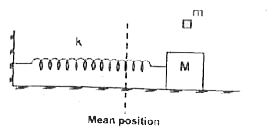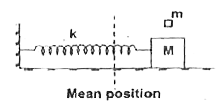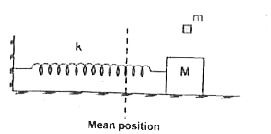A horizontal spring block system executes SHM with ampitude A = 10 cm initial phase ϕ=0 and angular frequency ω. The mass of block is M = 13kg and there is no friction between the block and the horizontal surface. The spring constant being 2500 N/m
At t=t1 sec [for which ωt1=ϕ1=30∘). A mass m = 12kg is gently put on the block. [Assume that collision between the block and the mass is perfectly inelastic and mass m remains stationary w.r.t the block M always]
![A horizontal spring block system executes SHM with ampitude A = 10 cm initial phase phi =0 and angular frequency omega. The mass of block is M = 13kg and there is no friction between the block and the horizontal surface. The spring constant being 2500 N/m At t = t(1) sec [for which omega t(1) = phi(1) = 30^(@)). A mass m = 12kg is gently put on the block. [Assume that collision between the block and the mass is perfectly inelastic and mass m remains stationary w.r.t the block M always] The new amplitude of the system will be](https://d10lpgp6xz60nq.cloudfront.net/physics_images/FIITJEE_PHY_MB_03_C02_SLV_057_Q01.png)
The new amplitude of the system will be
5 cm
8 cm
10 cm
none of these
The correct Answer is:B
ω.=ω√MM+m
x1=Asinϕ1
Potential energy stored in the spring at (t=t1)=12kx21=12Mω2sin2ϕ1
Let v and v. be the velocity of system just before collsion and just after collision, so using COLM
v.=Mv(M+m)=MAωcosθ(M+m)
Total energy after collision =PE+KE=12kx21+12(M+m)v2
=12MA2ω2[M+msin2θM+m]=12kA2[M+msin2θM+m]=8J
12(M+m)A2ω2=12MA2ω2[M+msin2θM+m]
A.=A√M+msin2θM+m=8cm
Topper's Solved these Questions
- SIMPLE HARMONIC MOTIONBook:FIITJEEChapter:SIMPLE HARMONIC MOTIONExercise:Assertion Reason type
Explore 1 Video
- SIMPLE HARMONIC MOTIONBook:FIITJEEChapter:SIMPLE HARMONIC MOTIONExercise:Numerical Based Questions
Explore 6 Videos
- SIMPLE HARMONIC MOTIONBook:FIITJEEChapter:SIMPLE HARMONIC MOTIONExercise:Solved Problems (Objective)
Explore 16 Videos
- SEMICONDUCTOR AND DEVICEBook:FIITJEEChapter:SEMICONDUCTOR AND DEVICEExercise:SOLVED PROBLEMS Objective: Level-I
Explore 20 Videos
- TEST PAPERSBook:FIITJEEChapter:TEST PAPERSExercise:PHYSICS
Explore 747 Videos
Similar Questions
A horizontal spring block system of mass M executes simple haormonic motion. When the block is passing through its equilibrium position, an object of mass m is put on it and the two move together. Find the new amplitude and frequency of vibration. Given, k is the spring constant of the system.
View SolutionA spring-block system is executing SHM. The mass of the block is M and the time period of oscillation is T. If the mass of the block is increased by m, then time period becomes 7T4. Now, find the ratio of mM ,
View Solution
Knowledge Check
A horizontal spring block system executes SHM with amplitude A = 10 cm initial phase ϕ=0 and angular frequency ω. The mass of block is M = 13 kg and there is no friction between the block and the horzontal surface. The spring constant being 2500N/M
At t=t1 sec [for which ωt1=ϕ1=30∘]. A mass m = 12 kg is gently put on the block. [Assume that collision between the block adn the mass is perfectly inelastic and mass m remains stationary w.r.t. the block M always]

The new angular frequency of the system will beA10 rad/secB15 rad/secC20 rad/secDnoneA horizontal spring block system executes SHM with ampitude A = 10 cm initial phase ϕ=0 and angular frequency ω. The mass of block is M = 13kg and there is no friction between the block and the horizontal surface. The spring constant being 2500 N/m
At t=t1 sec [for which ωt1=ϕ1=30∘). A mass m = 12kg is gently put on the block. [Assume that collision between the block and the mass is perfectly inelastic and mass m remains stationary w.r.t the block M always]

The total energy of system after collision at any moment of time isA4 jouleB8 jouleC12 jouleDnone of theseA horizontal spring block system executes SHM with amplitude A = 10 cm initial phase ϕ=0 and angular frequency ω. The mass of block is M = 13 kg and there is no friction between the block and the horzontal surface. The spring constant being 2500N/M
At t=t1 sec [for which ωt1=ϕ1=30∘]. A mass m = 12 kg is gently put on the block. [Assume that collision between the block adn the mass is perfectly inelastic and mass m remains stationary w.r.t. the block M always]

The total energy of system after collision at any moment of time isA4 jouleB8 jouleC12 jouleDnone of these
A block of mass M=1 kg resting on a smooth horizontal surface is connected to a horizontal light spring of spring constant k=6N/m whose other end is fixed to a verticall wall. Another block of mass m=0.5 kg is placed over the block M. If the coefficient of friction between the two blocks μ=0.4, find the maximum kinetic energy (in J) that the system can have for simple hormonic oscillation under the action of the spring.
View SolutionA horizontal spring-block system of mass 1kg executes SHM of amplitude 10 cm. When the block is passing through its equilibrium position another mass of 1kg is put on it and the two move together.
View SolutionIn a horizontal spring-block system force constant of spring is k = 16N/m, mass of the block is 1 kg. Maximum kinetic energy of the block is 8J. Then
View SolutionA horizontal spring -block system of mass 2kg executes S.H.M when the block is passing through its equilibrium positiojn an object of mass 1kg is put on it the two move togather The new amplitude of vibration is (A being its initial amplitude)
View SolutionTwo blocks of masses m1 and m2 are connected by a spring having spring constant K. Initially , the spring is at its natural length. The coefficient of friction between the blocks and the surface is μ. What minimum constant force has to be applied in the horizontal direction to the block of mass m1, in order to shift the other block ?
View Solution

